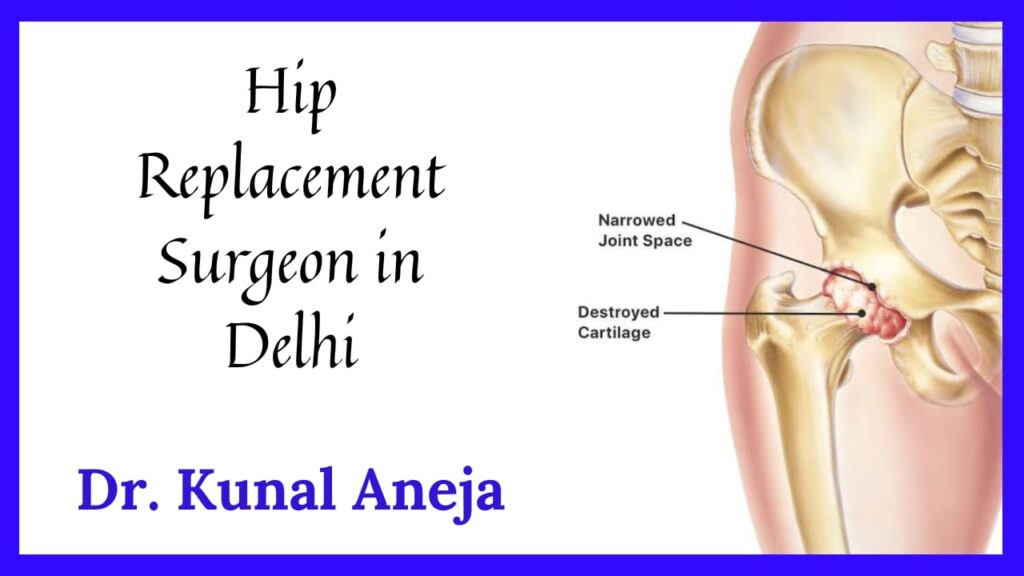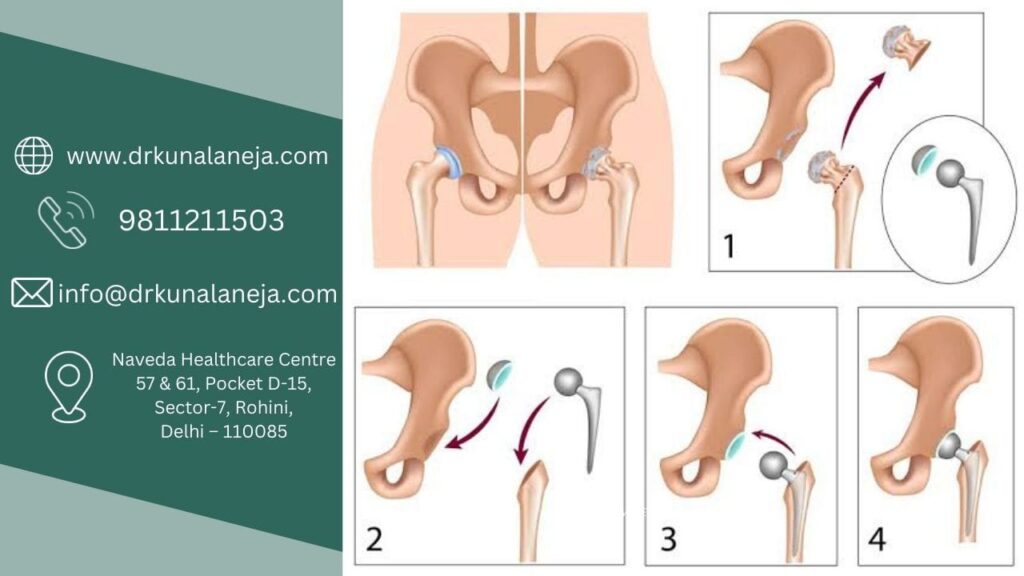
Dr. Kunal Aneja is Best Hip Replacement Surgeon in Delhi
If you’ve just started considering treatment options, or already made the decision to have Hip Replacement Surgeon in Delhi, this article will help you know the advantages and drawbacks that come with total hip replacement. This article will explain:
- How do normal hips function?
- The root causes of hip pain
- What should you expect from hip replacement surgery?
- What exercises and activities can assist in recovering your strength and mobility, and allow you to get back to your regular routines
If your hip is injured by fracture, arthritis or any other condition regular activities like walking, or getting in and from a seat can be painful and challenging. Your hip could be stiff and it could be difficult to wear your socks and shoes. It is possible that you find it difficult to rest.
If you find that medications, changes to your routine activities, as well as your use of walk support don’t help alleviate your pain, then you should look into hip replacement surgery. The hip replacement procedure is a safe and efficient procedure that can ease your pain, improve mobility and enable you to return to regular activities.
The hip replacement procedure is one of the most successful procedures in the field of medical practice. Since the 1960s, advances of joint-replacement surgical procedures and technologies have significantly enhanced the efficacy for total replacement of the hip. Based on the Agency for Healthcare Research and Quality More than four million total replacements of the hip are done every annually in the United States.
Anatomy
The hip is among the most significant joints of the body. It is an acetabulum joint. The socket is created by the acetabulum which forms part of pelvis bone. The ball is also known as the femoral head which is the top end of the femur (thighbone).
The bones of the socket and ball are covered by cartilage articular, an elastic tissue that cushions the edges of bones and allows them to move freely.
A thin, slender tissue known as the synovial membrane is found around the joint of your hip. In a healthy, healthy hip, the synovial membrane produces a tiny amount of fluid that helps to lubricate the cartilage , and eliminates virtually all friction in hip movements.
The ligaments, or bands of tissue (the hip capsule) connect the socket and the ball and help stabilize the joint.
Common Reasons for Hip Pain
The most frequent reason for chronic hip discomfort and disability is arthritis. Rheumatoid arthritis, osteoarthritis and traumatized arthritis are among the most frequent forms of the disease.
- Osteoarthritis. This is an wear and tear induced by age of arthritis. It typically occurs in those who are 50 or over, but is more common in those with a experience of arthritis. The cartilage that cushions the hip bones gets worn away. The bones collide creating hip stiffness and pain. Osteoarthritis could be triggered or increased due to subtle differences in how the hip develops in the beginning of.
- Rheumatoid arthritis. This is an auto-immune disease where the synovial membrane is thicker and more inflamed. The constant inflammation can cause damage to the cartilage and cause stiffness and pain. Rheumatoid arthritis is among the most commonly encountered type of class of conditions known as inflammation arthritis.
- Posttraumatic arthritis. This can follow an injury to the hip that is serious or a fracture. The cartilage could be damaged, causing stiffness and hip pain as time passes.
- Osteonecrosis. An injury to the hip, like fracture or dislocation could limit blood flow to the head of the femoral. It is known as osteonecrosis (also sometimes referred to necrosis vascular). The absence of blood could cause the bone’s surface to break down and cause arthritis. Certain diseases may also trigger osteonecrosis.
- Hip problems in children. Some infants and children suffer from hip issues. Although the issues are well-treated in the early years but they can result in arthritis later in the course of. The reason for this is that the hip might not develop normaly, and joints are affected.
Description
When you have a complete hip replacement (also known as the total hip joint) the injured cartilage and bone is removed and replaced by prosthetic parts.
- The damaged part of the head is taken off and replaced by a metal stem, which is inserted inside the hollow center of the femur. The femoral head can be cement-based or “press to fit” to the bones.
- A ceramic or metal ball is placed on the upper portion of the stem. The ball will replace the damaged head of the femoral which was removed.
- The cartilage surface that has been damaged on the socket (acetabulum) is removed and replaced by the socket made of metal. Cement or screws can be employed to keep the socket in the right position.
- A ceramic, plastic or metal spacer is put between the ball that is being replaced and the socket to make for a smooth , smooth surface.
Do you think Hip Replacement Surgery for You?
The decision to undergo hip replacement surgery must be a joint decision made by your family, you as well as your primary physician as well as your orthopaedic physician. The process of deciding usually starts with a referral from your physician to an orthopaedic surgeon an initial examination.
When Surgery is Recommended
There are a variety of reasons your physician might recommend the hip replacement procedure. The people who can benefit from hip replacement surgery typically are:
- A hip pain that restricts daily things, such as walking or the ability to bend
- Hip pain that persists while taking a break, in the morning or at night.
- The stiffness of the hip restricts the ability of the leg to lift or move the leg.
- Insufficient pain relief with anti-inflammatory medicines physical therapy, walking aids
Candidats for Surgery
There are no weight or age limits for total hip replacements.
The recommendation for surgery is based on the patient’s disability and pain, not on their age. The majority of patients who undergo a total hip replacements are aged 50 to 80, however, orthopaedic surgeons assess the patients on an individual basis. Hip replacements with total hips are carried out successfully for all ages starting from the young teenager who suffers from arthritis in the juvenile stage to the elderly person with degenerative arthritis.
The Orthopaedic Evaluation
An examination by an orthopaedic surgeon is comprised of many parts:
- Medical background. Your orthopaedic surgeon will collect information about your general health condition and will ask questions about the severity of hip pain and how it impacts your ability to carry out everyday tasks.
- Physical exam. This will assess hip flexibility, strength, and alignment.
- X-rays. These images help to determine the severity of deformity or damage to your hip.
- Tests other than HTML0. Occasionally other tests such as an magnetic resonance imaging (MRI) scan, could be required to assess the health of the bone and soft tissues in your hip.
A hip replacement surgery decision
Talk To Doctor Kunal Aneja

Your orthopaedic doctor will go over the findings of your examination with you, and will discuss whether it is the most effective solution to alleviate the pain and increase your mobility. Other options for treatment include physical therapy, medications or different types of surgery might be looked at.
Additionally your orthopaedic physician will discuss the possible hazards and potential complications of the hip joint replacement procedure, which includes those that are related to the procedure as a whole and those that could develop over time following the procedure.
Do not be afraid to ask your doctor questions if you do not understand. The more you are aware how to communicate with your doctor, the better you’ll be able to handle the changes hip replacement surgery could bring to your daily life.
Relative Expectations
The most important aspect to consider when deciding whether to undergo the hip replaced is knowing what the procedure will and won’t accomplish. Many patients that undergo hip replacement will experience an immediate reduction in hip pain, as well as a substantial improvement in their capacity to perform the routine activities of living.
When you are active and use it regularly the material that connects the head and socket of each hip replacement implant starts to wear. Overweight or excessive activity could accelerate the normal wear process and result in that the replacement hip to lose its elasticity and then become painful. Thus, many surgeons recommend against activities that are high-impact like running, jogging, jumps or any other sports that are high-impact.
The most realistic activities after total hip replacement are unlimited walking, swimming driving, golf, hiking cycling, dancing and other activities that require minimal impact.
If you can modify your activity the hip replacements will last for a long time.
content by best healthcare marketing agency

